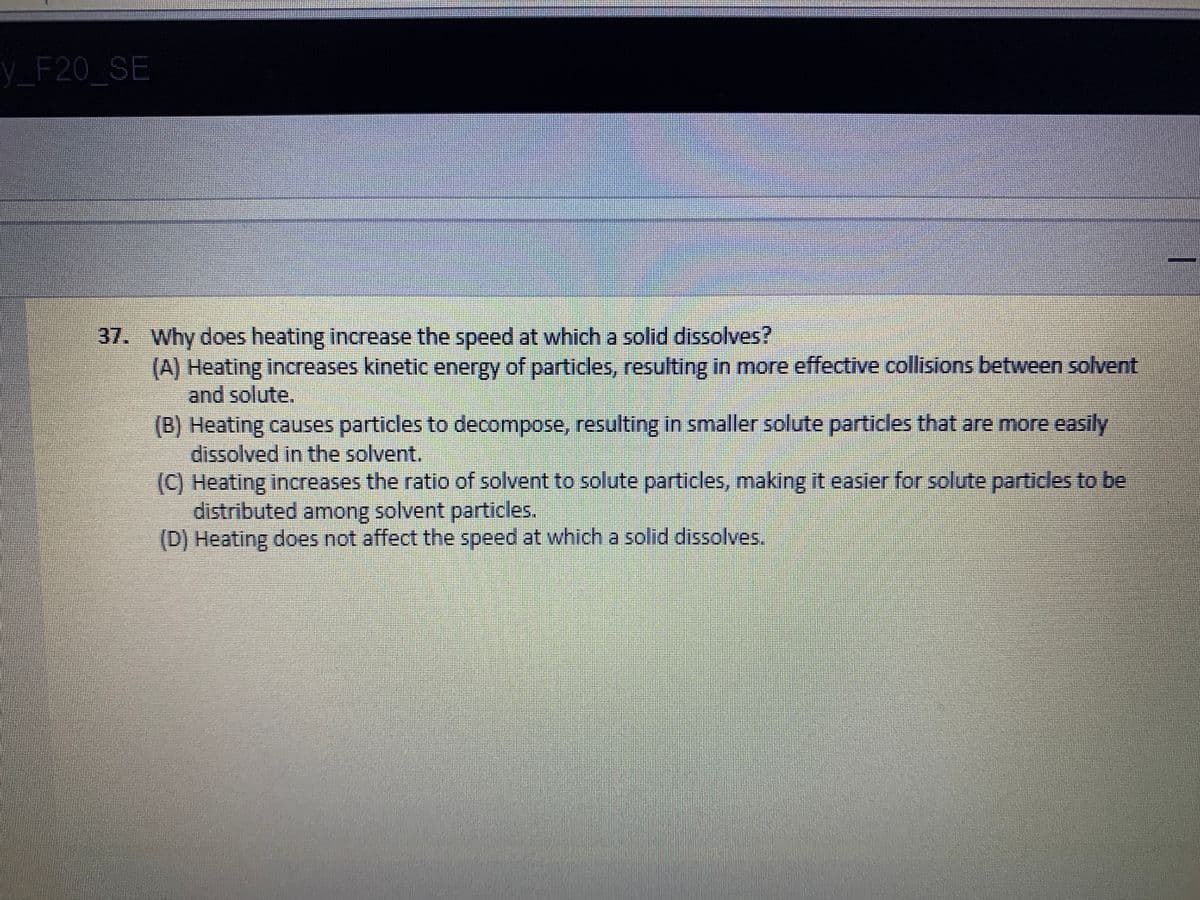37. Why does heating increase the speed at which a solid dissolves? (A) Heating increases kinetic energy of particles, resulting in more effective collisions between solvent and solute. (B) Heating causes particles to decompose, resulting in smaller solute particles that are more easily dissolved in the solvent. (C) Heating increases the ratio of solvent to solute particles, making it easier for solute particles to be distributed among solvent particles. (D) Heating does not affect the speed at which a solid dissolves.
37. Why does heating increase the speed at which a solid dissolves? (A) Heating increases kinetic energy of particles, resulting in more effective collisions between solvent and solute. (B) Heating causes particles to decompose, resulting in smaller solute particles that are more easily dissolved in the solvent. (C) Heating increases the ratio of solvent to solute particles, making it easier for solute particles to be distributed among solvent particles. (D) Heating does not affect the speed at which a solid dissolves.
Chemistry: The Molecular Science
5th Edition
ISBN:9781285199047
Author:John W. Moore, Conrad L. Stanitski
Publisher:John W. Moore, Conrad L. Stanitski
Chapter13: The Chemistry Of Solutes And Solutions
Section: Chapter Questions
Problem 127QRT
Related questions
Question
Why does heating increase the speed at which a solid dissolves??

Transcribed Image Text:y_
F20 SE
37. Why does heating increase the speed at which a solid dissolves?
(A) Heating increases kinetic energy of particles, resulting in more effective collisions between solvent
and solute.
(B) Heating causes particles to decompose, resulting in smaller solute particles that are more easily
dissolved in the solvent.
(C) Heating increases the ratio of solvent to solute particles, making it easier for solute particles to be
distributed among solvent particles.
(D) Heating does not affect the speed at which a solid dissolves.
Expert Solution
This question has been solved!
Explore an expertly crafted, step-by-step solution for a thorough understanding of key concepts.
This is a popular solution!
Trending now
This is a popular solution!
Step by step
Solved in 2 steps

Knowledge Booster
Learn more about
Need a deep-dive on the concept behind this application? Look no further. Learn more about this topic, chemistry and related others by exploring similar questions and additional content below.Recommended textbooks for you

Chemistry: The Molecular Science
Chemistry
ISBN:
9781285199047
Author:
John W. Moore, Conrad L. Stanitski
Publisher:
Cengage Learning


Chemistry
Chemistry
ISBN:
9781305957404
Author:
Steven S. Zumdahl, Susan A. Zumdahl, Donald J. DeCoste
Publisher:
Cengage Learning

Chemistry: The Molecular Science
Chemistry
ISBN:
9781285199047
Author:
John W. Moore, Conrad L. Stanitski
Publisher:
Cengage Learning


Chemistry
Chemistry
ISBN:
9781305957404
Author:
Steven S. Zumdahl, Susan A. Zumdahl, Donald J. DeCoste
Publisher:
Cengage Learning


Chemistry: An Atoms First Approach
Chemistry
ISBN:
9781305079243
Author:
Steven S. Zumdahl, Susan A. Zumdahl
Publisher:
Cengage Learning

EBK A SMALL SCALE APPROACH TO ORGANIC L
Chemistry
ISBN:
9781305446021
Author:
Lampman
Publisher:
CENGAGE LEARNING - CONSIGNMENT